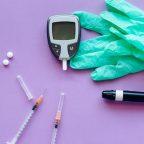- The Connection Between Carbs and High Blood Sugar
- Can Vitamin B Prevent Peripheral Neuropathy Caused by Diabetes?
- Diabetic Gout: The Overlooked Complication of Type 2 Diabetes
- Do Pine Nuts Lower Blood Sugar?
- Carb Cycling and Blood Sugar
- What Role Does Exercise Play in Reversing Pre-diabetes?
- Blood Sugar Dropping
- Why a Diabetes Supplies Bag is a Game-Changer for Managing your Health
- Alternative Treatments for Diabetes
- Erythritol, a Common Sweetener, Linked to Potential Heart Attacks
- Is Yoga Good for Diabetes
- Is Pine Needle Tea Good for Diabetics
- Diabetes and Sleep
- Are Beans Good For Diabetics?
- Do You Have Cloudy Urine?
- How does Metabolism Affect Healthy Blood Sugar
- Propolis Benefits for Diabetes
- Medicinal Uses of Amla (Indian Gooseberry) for Diabetics
- Blood Sugar Dropping
- Black Rice Benefits for Diabetes
- August 2023
- July 2023
- May 2023
- April 2023
- March 2023
- February 2023
- January 2023
- December 2022
- November 2022
- October 2022
- September 2022
- August 2022
- July 2022
- June 2022
- May 2022
- December 2021
- November 2021
- April 2021
- September 2018
- July 2018
- June 2018
- May 2018
- April 2018
- February 2018
- October 2017
- June 2017
- May 2017
- November 2016
- October 2016
- September 2016
- August 2016
- July 2016
- April 2016
- March 2016
- February 2016
- October 2014
- March 2014
- November 2013
- October 2013
- September 2013
- March 2011
- October 2009
Posts Tagged ‘does metabolism affect blood sugar’

How does Metabolism Affect Healthy Blood Sugar
The physiological process of obtaining energy from food is known as metabolism. By lowering insulin levels, diabetes affects metabolism. Thus, the body is unable to store the energy it receives from food for later use.
This occurs in type 1 diabetes as a result of the immune system targeting the pancreatic cells that produce insulin. When a person has type 2 diabetes, their body no longer reacts to insulin as it should.
We shall examine diabetes and metabolism in more detail in this article.
What is metabolism?
The body produces energy from the food and liquids a person consumes through a process called metabolism.
After a meal, the body starts digesting the food to release the energy stored in the carbs, proteins, and lipids. In order to maintain the function of the organs and biological processes, the body utilizes this energy.
The body burns up energy primarily in three ways:
• Resting energy expenditure: This is a reference to the energy the body utilizes when it is at rest. It is comparable to the basal metabolic rate (BMR), which is the amount of energy required by the body for its most fundamental and vital processes, like breathing.
• Diet-induced energy expenditure: This is a reference to the energy a person expends during digestion. The thermic effect of food is another name for it.
• Activity-induced energy expenditure: The energy used through physical exertion is what is meant by this. An individual’s energy expenditure increases with increased activity.
Low BMRs are typical in people with slow metabolic rates. Because of this, they need fewer calories while at rest than someone with a rapid metabolism or a high BMR.
BMR can vary depending on a variety of factors, such as:
• Muscle mass
• Bone size and density
• Body fat
• Age, as muscle mass tends to decrease as people get older
• Genetics
How does diabetes affect metabolism?
Diabetes affects the body’s capacity to release and retain energy from food since it is a metabolic condition. Insulin manufacturing issues are the cause of this.
Carbohydrates are first broken down by the body into glucose, which is their most basic form when consumed. Cells all across the body receive energy from this glucose once it has entered the bloodstream.
Insulin is often released by the pancreas in response to excessive blood glucose levels. This hormone instructs the liver to transform blood sugar into glycogen, which the body can use later, by removing glucose from the circulation.
Diabetes, however, causes insulin levels to fall below normal levels. As a result, the blood glucose levels are elevated, which might have detrimental effects if left untreated.
There are two primary forms of diabetes:
Type 1 diabetes
When someone has type 1 diabetes, their insulin levels are either very low or nonexistent. The immune system wrongly assaults the pancreatic cells that produce it, which is why it happens. Thus, type 1 diabetics require insulin shots for the duration of their lives.
A type 1 diabetes diagnosis is typically given to a patient while they are a kid or a young adult. The majority of diabetes cases—5–1–0o%—are caused by it.
Type 2 diabetes
When a person has type 2 diabetes, their body stops responding to insulin as well, which raises blood glucose levels. The pancreas gradually generates more and more insulin in an effort to keep up.
As a result, there is a deficiency in the body’s ability to handle the amount of glucose in the blood. The insulin-producing cells in the pancreas eventually deteriorate Trusted Source.
90% of occurrences of diabetes are type 2 cases, which are far more prevalent than type 1 cases.
How does diabetes affect protein metabolism?
The body can use protein as an energy source in addition to carbohydrates. The body has the ability to use the protein in its muscles as fuel in particular circumstances. Catabolism is what experts call it.
In an older article from 2008, it is said that individuals with type 1 diabetes who do not receive enough insulin from their medicine may undergo catabolism, which results in a large loss of muscle mass. People with type 2 diabetes do not experience the same effect.
How does diabetes affect fat metabolism?
A person’s body can use and store glucose efficiently when they have an adequate supply of insulin.
But without insulin, the body can start turning to its fat reserves. Ketosis, as it is known among professionals, is the mechanism responsible for this.
The body produces ketones, which are substances that are formed when fats are broken down, during the ketosis state. The blood can become acidic if ketone levels rise too high. This leads to a dangerous condition known as diabetic ketoacidosis (OKA).
Although it can happen in people with type 2 diabetes as well, OKA is more common in people with type 1 diabetes. It is a potentially fatal condition that needs urgent care.
People can check their ketone levels with urine test strips or blood ketone monitors.
Here you may find information on OKA symptoms.
Body weight, nutrition, and exercise effects
On metabolism and the likelihood of acquiring type 2 diabetes, diet, activity, and body weight all play a significant role.
Diet
Blood glucose levels can rise as a result of a diet that is rich in simple carbs, which break down fast and give one more energy than they require.
It is possible that the body will not be able to create enough insulin to bring the levels down to a healthy level if they continue to rise over time. Consequently, type 2 diabetes may eventually develop as a result.
Furthermore, while having a high energy density, simple carbs do not fill you up as much as other foods. Because of this, they might eat more, which would increase blood sugar levels. This could also make them feel hungrier.
Simple carbs can be found in sweets, sugary drinks, ice cream, and other high-sugar foods.
Complex carbs deliver their energy gradually over a longer period and take longer to break down. Whole grains, legumes, and vegetables high in fiber are a few examples of them.
Exercise
Activity-induced energy expenditure increases when someone exercises or engages in other physical activity. As a result, blood glucose levels can be lowered since the body can use up the blood glucose that is circulating in the body.
Muscle mass can also be increased by strengthening activities. When a person has larger muscular mass, they burn more calories at rest because muscle cells need energy even when they are not being used.
Body weight
The metabolism is influenced by body weight as well.
By making body cells less responsive to insulin, a high body weight raises the chance of developing type 2 diabetes. This makes it less likely for cells to retain extra glucose as effectively, increasing the likelihood of high blood sugar.
Type 2 diabetes can be brought on by a combination of being overweight, eating a diet rich in simple carbs, and doing a little exercise.
How does insulin medication affect metabolism?
The hormone insulin increases the absorption and storage of glucose as glycogen in the muscle, liver, and fat cells. A person’s blood glucose levels drop as a result of this.
The goal is to achieve a balance between blood glucose and insulin in diabetics. This indicates that a person has adequate energy available for consumption, but not excessive amounts that they run the danger of long-term health issues.
An excessive amount of insulin can lower blood sugar to risky levels, which is known as hypoglycemia. Insufficient utilization results in hyperglycemia.
Summary
Diabetes affects how the body processes and stores energy, which hampers metabolism. The hormone insulin, which regulates the quantity of glucose in the blood, is deficient, which is why this occurs.
Blood glucose levels can become excessive if there is not enough insulin, which over time results in a number of issues. People with type 2 diabetes can lower their blood sugar levels by improving their BMR and insulin sensitivity through physical activity, muscle building, and achieving or maintaining a healthy weight.
The consistent balancing of blood sugar levels throughout the day can be assisted by complex carbs.
FAQ
How does diabetes relate to metabolism?
People with diabetes and those without the disease have very identical metabolisms. The amount and/or efficiency of the insulin that the body produces are the only things that differ.
Why is sugar metabolism important?
The production of ATP, which serves as the basis for both neuronal and non-neuronal cellular maintenance as well as the production of neurotransmitters, as well as glucose metabolism fuels physiological brain function.
What regulates blood sugar and metabolism?
Because it produces and secretes glucagon and insulin, the pancreas plays a crucial part in preserving appropriate blood glucose levels.
Can high metabolism cause low blood sugar?
Your metabolism will be boosted and your blood sugar will be further lowered if you continue to lead an active lifestyle. Keep these things in mind if you want to boost your metabolism and lower your risk of developing diabetes.
How do you metabolize sugar better?
Consume some slow-digesting protein and fiber to help keep your blood sugar levels stable. You risk feeling hungry and wanting to eat again if you don’t because your blood sugar will plummet if you don’t. Apples with nut butter, pistachios and a hard-boiled egg, and hummus and vegetables are all delicious options for snacks.
What happens if metabolism is high?
You will burn more calories both at rest and when you are active if your metabolism is “high” (or fast). You’ll need to consume more calories to maintain your weight if you have a high metabolism. One explanation for why some people can eat more than others without gaining weight is because of this.
Does the body metabolize sugars differently?
In our bodies, natural and added sugars are metabolized in the same way. However, since the amount of sugar tends to be low and is “packed” with fiber and other beneficial nutrients, eating natural sugars in foods like fruit is not associated with adverse health impacts for the majority of people.
Where is sugar metabolized most in the body?
Instead, these substrates are mostly processed in the gut and liver, which are splanchnic organs. Here, they are transformed into other, more common energy substrates like glucose, lactate, fatty acids, or acetate.
What foods help metabolize sugar?
The foods listed below may aid in controlling your blood sugar.
Sprouts made from broccoli and broccoli. Among the isothiocyanates, sulforaphane has the ability to lower blood sugar levels.
- Seafood
- Pumpkin and pumpkin seeds
- Nuts and nut butter
- Okra
- Flax seeds
- Beans and lentils
- Kimchi and sauerkraut
Is it healthier to have a high metabolism?
The benefits of having a fast metabolism include the ability to burn calories more quickly than those with a slow metabolism. A quick metabolism, on the other hand, can make it difficult to put on weight or keep up a balanced diet.
What organ is responsible for metabolism?
Every metabolic process the body goes through has the liver at its center. The liver cells convert lipids into energy during the fat metabolism process.

What is Glucose Metabolism?
Glucose Metabolism
Both insulin and glucagon are essential in controlling glucose levels in the body. We have been looking at diabetes for decades through the lens of a bi-hormonal approach to glucose control. However, this viewpoint must fully explain why patients and healthcare providers need help maintaining stable blood sugar levels.
The intensive use of insulin for diabetes management is laden with difficulties and dangers. Unpredictable glucose changes are prevalent, as are hypoglycemia and weight gain, despite our best attempts to prevent them. Other glucoregulatory hormone shortages or abnormalities may contribute to these difficulties. A multi-hormonal approach to glucose homeostasis has emerged as scientists learn more about the functions of various pancreatic and incretin hormones.
Understanding Diabetes
Since insulin was discovered in the 1920s, our knowledge of diabetes as a metabolic illness has advanced considerably. The hormone insulin was shown to be a significant controller of glucose homeostasis and secretion.
Later, it was thought that diabetes was caused by an insulin shortage, either total or partial. Insulin has been the cornerstone of treatment for those with insulin-deficient type 2 diabetes and the sole pharmacological option for people with type 1 diabetes since its discovery.
We now have a deeper appreciation for how many distinct hormones work together to maintain healthy glucose levels in the body, thanks to identifying new hormones with glucoregulatory functions.
Glucagon was first identified as a potent inducer of glucose synthesis in the liver in the 1950s. This finding contributed to developing a more nuanced understanding of the dynamic between insulin and glucagon and, ultimately, adopting a more comprehensive “bi-hormonal” approach to diagnosing diabetes.
In 1987, scientists discovered amylin, a second ß-cell hormone. The function of amylin was shown to be complementary to insulin, and amylin deficiency was seen in diabetics. This newer discovery led to a conception of glucose homeostasis in terms of a complex network of pancreatic hormones.
Several gut hormones were discovered around the middle of the 1970s. Glucagon-like peptide-1 (GLP-1) is an incretin hormone that has been shown to have a significant role in keeping glucose levels stable. Current knowledge suggests insulin, glucagon, amylin, and incretin regulate glucose homeostasis.
The Body’s Glucose Metabolic Process
Sugars may be broken down into their parts, and glucose is one of the simplest. Glucose is a primary fuel source for the body’s organs, tissues, and metabolic activities, and it circulates throughout the body as blood glucose.
Glucose is produced in the human digestive system in response to sugar consumption and is used for cellular refueling. As glucose from ingested carbs enters the circulation, insulin is secreted by the pancreas to transport the glucose to the cells, where it may be used for energy or stored.
Your blood sugar may also be impacted by the amount of fat and protein you consume. The breakdown of fat into fatty acids is a slow process compared to the rapid deterioration of carbohydrates. Although animal studies have shown that a high-fat diet is related to an increased risk of insulin resistance, studies in humans have found that a high-fat meal has a modest influence on post-meal glucose and insulin.
Protein is metabolized similarly to carbohydrates, although it has a distinct impact on blood sugar levels. Proteins are first broken down into amino acids in the stomach, with further digestion occurring in the intestines. Some amino acids are metabolized in the liver into glucose, while others are synthesized into protein for the muscles. Protein’s impact on blood sugar levels might be muted when there’s already enough insulin in the system.
Carbohydrates are the body’s go-to for getting its hands on glucose, which is used for metabolic processes. Without carbohydrates, the body may produce glucose through gluconeogenesis from fatty acids (via glycerol) and proteins (by the amino acid glutamine).
The glucose uptake into tissue cells and its subsequent conversion to adenosine triphosphate (ATP) is known as glucose metabolism. The breakdown of glucose into pyruvate and ATP is known as glycolysis, and it occurs in the cytoplasm of mitochondria.
ATP is the body’s “energy currency,” required for everything from muscular contraction to nerve signal transmission to cell division and growth to initiating chemical processes necessary for producing hormones, cell membranes, and countless other essential components.
Do You Require Glucose for Your Body to Function?
Yes. As an immediate fuel source, glucose is the body’s first choice. Among the many body parts that may run on glucose are:
- Brain: Unless you’re starving for a long time, glucose is the only thing your brain uses for energy. Without the ability to store energy, the brain needs a constant supply of glucose, which is why it needs 120 grams daily. In terms of calories, that’s around 420.
- Muscles: Muscles use glucose, ketones, and fatty acids as primary fuels. Forces account for almost three-quarters of the body’s total glycogen storage. Quick bursts of activity are best powered by glucose.
- Adipose tissue: Adipose tissue is the name for the fat cells that everyone wants to get rid of.
- Triacylglycerols, the primary energy storage mechanism for fat cells, cannot be made without glucose. Determining whether fat cells release fatty acids into the circulation to be utilized as the glucose level within the cells aids energy.
- Kidney: As the kidneys filter blood plasma about 60 times daily, glucose is reabsorbed each time. The kidneys can undergo gluconeogenesis and produce glucose when there’s a lack of food or when glucose isn’t easily accessible for use as an energy source.
- Liver: As the body’s primary metabolic organ, the liver breaks down glycogen stores and performs gluconeogenesis to generate glucose for circulation. When you’re fasting, your liver breaks down fat into ketone bodies.
- Glucose is essential for the body to operate normally. Glucose may be obtained from carbohydrates in the food or synthesized by the liver and muscle cells (a process known as gluconeogenesis). Ketones may be used as an energy source when carbs are scarce in the diet.
Is There an Optimal Diet for Boosting Blood Sugar Levels?
Ketones help fuel and protect the body from the glucose surges resulting from eating or drinking certain high-glycemic carbs or sugary beverages. This is a selling factor for low-carb diets like the ketogenic diet.
Diets High in Protein and Fat and Low in Carbohydrates
There is growing evidence suggesting health advantages to eating a lower-carbohydrate diet. However, many individuals find that low-carb diets, especially very low-carb diets like the ketogenic diet, need to be more sustainable over the long term.
Additionally, a low-glycemic diet, which emphasizes choosing foods and meal combinations that induce a low-glycemic response, may be as effective in promoting weight reduction and enhancing insulin sensitivity.
Exercise
Stabilizing blood sugar levels is aided by exercise, which, according to studies, improves insulin sensitivity and helps recover glucose metabolism in insulin-resistant muscles for up to 48 hours after that. Understanding this helps put the research above findings contrasting the effects of a high-glycemic and low-glycemic diet, which both required participants to exercise, into perspective.
Recommendations
Choose a diet restricting processed meals and eating more nutrient-dense natural foods. Make good use of your workout time. Avoid sugary beverages (make flat water and sparkling water your new BFFs), and make sleep a priority. You’ll see improvements in glucose metabolism and body fat percentage.
Frequently Asked Questions
How does glucose effect metabolism?
Energy metabolism revolves around glucose. Glucose is the universal fuel for the developing animal and is produced from the breakdown of all three macronutrients (carbohydrates, lipids, and proteins).
What effect does metabolism have on blood sugar levels?
Metabolism is the physiological process through which the body obtains energy from the food it consumes. Low insulin levels, a result of diabetes, hurts metabolism. Because of this, the body cannot save any of the energy it receives from meals.
How is glucose metabolized by the body?
Too much glucose in the bloodstream causes the pancreas to secrete insulin, which causes cells to absorb glucose (such as muscle cells) and bring blood glucose back to normal levels. When insulin is present, the body shifts its metabolism away from fat and toward glucose as its primary fuel source.
What do we name the chemical reactions that turn glucose into energy?
Glycolysis refers to the metabolic process through which glucose is transformed into pyruvate.
Is glucose a necessary substrate for metabolism?
Yes. If you want to fuel your body, glucose is your best bet. Among the tissues and cells in the body that may utilize glucose for energy are: Except for when you’re starving for an extended period, your brain runs almost exclusively on glucose.
Is a fast metabolism associated with an increased risk of developing diabetes?
If you have diabetes, your metabolic rate won’t change any differently than it would otherwise. It’s not the metabolism that diabetes directly affects. However, it alters insulin sensitivity, which may affect health and weight.




